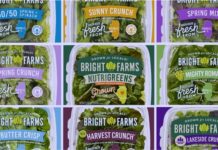Lately I’ve been doing The New York Times crossword puzzle daily. OK, it’s not the regular one; it’s a mini version available through the publication’s app, but it’s still a puzzle, right? I am also hooked on the app Lumosity, which provides a variety of cognitive games. You might say I’m obsessed with brain health. After all, I want to be like my grandmother who, in her late 80s, was still killing it when she watched “Wheel of Fortune.”
As a nutritionist, I can’t help but also look for foods to keep my mind sharp. Science supports a strong connection between certain nutrients and cognitive function, and I would be foolish to ignore it. So starting today, I am aiming to consume the following four nutrients on a regular basis. You should join me.
1. Omega-3 Fatty Acids
EPA and DHA omega-3s are nutrients that play a key role in brain health. Neurons in the brain, which are rich in DHA, process and transmit electrical and chemical messages that enable our bodies to function normally. Low levels of DHA may hinder the brain’s ability to function at its best. What you have to keep in mind is that the body does not efficiently produce EPA and DHA on its own, so these nutrients must come directly from food. There are three simple ways to get the recommended amounts of EPA and DHA: eating fatty fish (salmon or sardines), eating EPA- and DHA-fortified foods and beverages (eggs) or taking omega-3 supplements.
2. Choline
As the brain’s instant messenger, choline provides a connection between the brain and muscles, helping to support memory and retention. Choline is especially critical to visual memory; the kind adults employ to remember a new route after driving it only once. (In other words, more choline might equal less reliance on GPS.) The best sources of choline are Brussels sprouts, liver, lima beans, eggs and wheat germ. Unfortunately, these foods are not everyone’s favorites, except maybe the eggs and, for me, the Brussels sprouts. So in order to meet the U.S. Food and Drug Administration’s recommended daily allowance of 500 milligrams of choline daily, a supplement might be a good idea.
3. Vitamin E
Vitamin E is an antioxidant, which is known to help protect the cells in your body against free radical damage. There has been some promising research on the relationship between vitamin E and Alzheimer’s, and how it may slow the progression of the disease. Some may argue that it makes sense to consume adequate amounts of this vitamin before any onset of the disease even begins. Vitamin E-rich foods include nuts and seeds, dark leafy greens, olive oil and whole grains. Research on the benefits of supplementing with vitamin E is not conclusive.
4. Flavonoids
Flavonoids, another type of antioxidant, have also been found to be beneficial to an aging brain. Its anti-inflammatory properties are especially beneficial for memory recall. Specific studies have shown improvements in cognitive function and blood flow to the brain specifically with the consumption of cocoa. And who doesn’t love chocolate? Other food and beverages sources include tea, red wine, grape juice, blueberries, raspberries, tomatoes, and kidney and black beans. Since it’s so easy to consume adequate amounts of flavonoids through the diet, supplementation is probably not needed.




